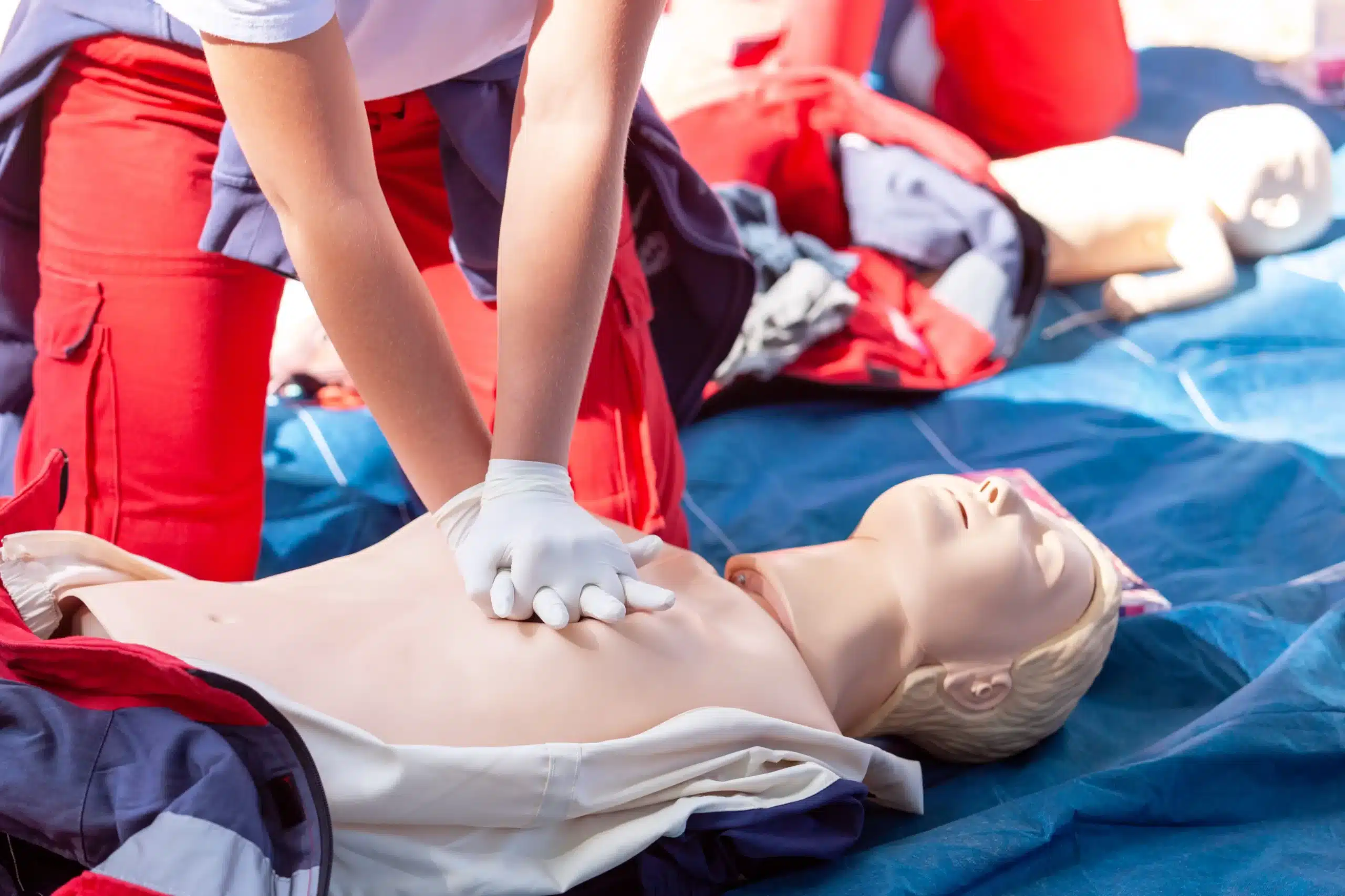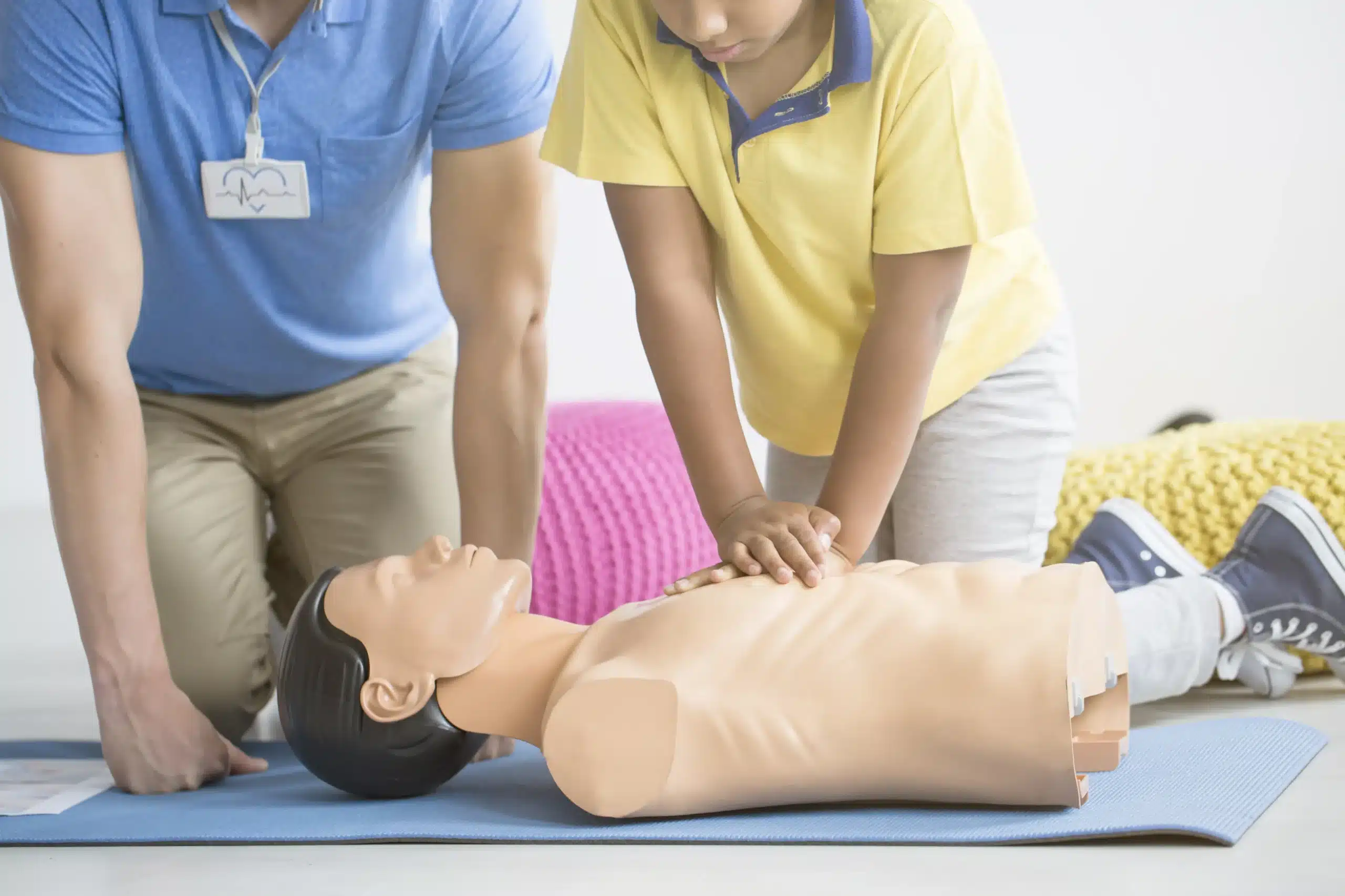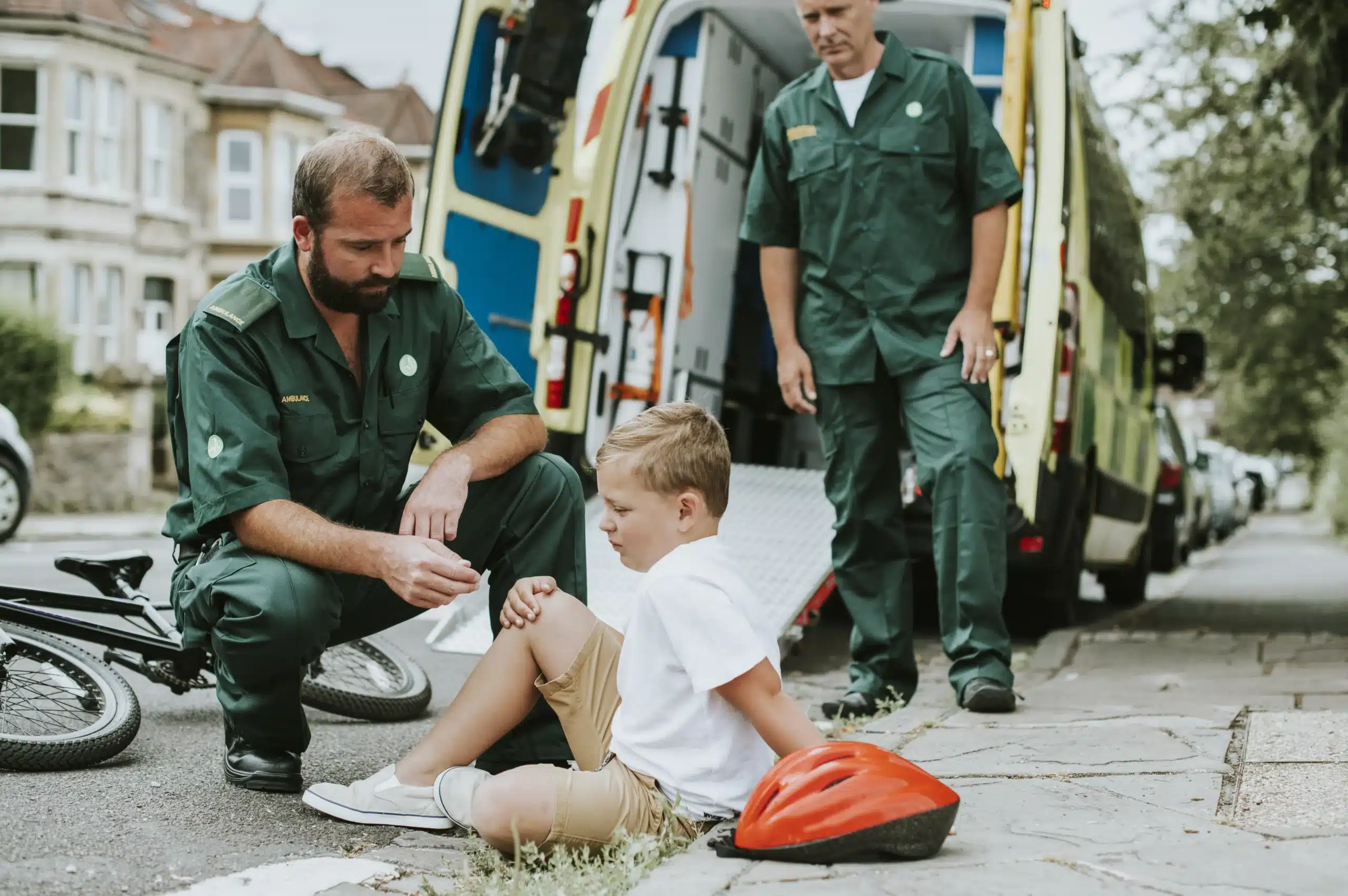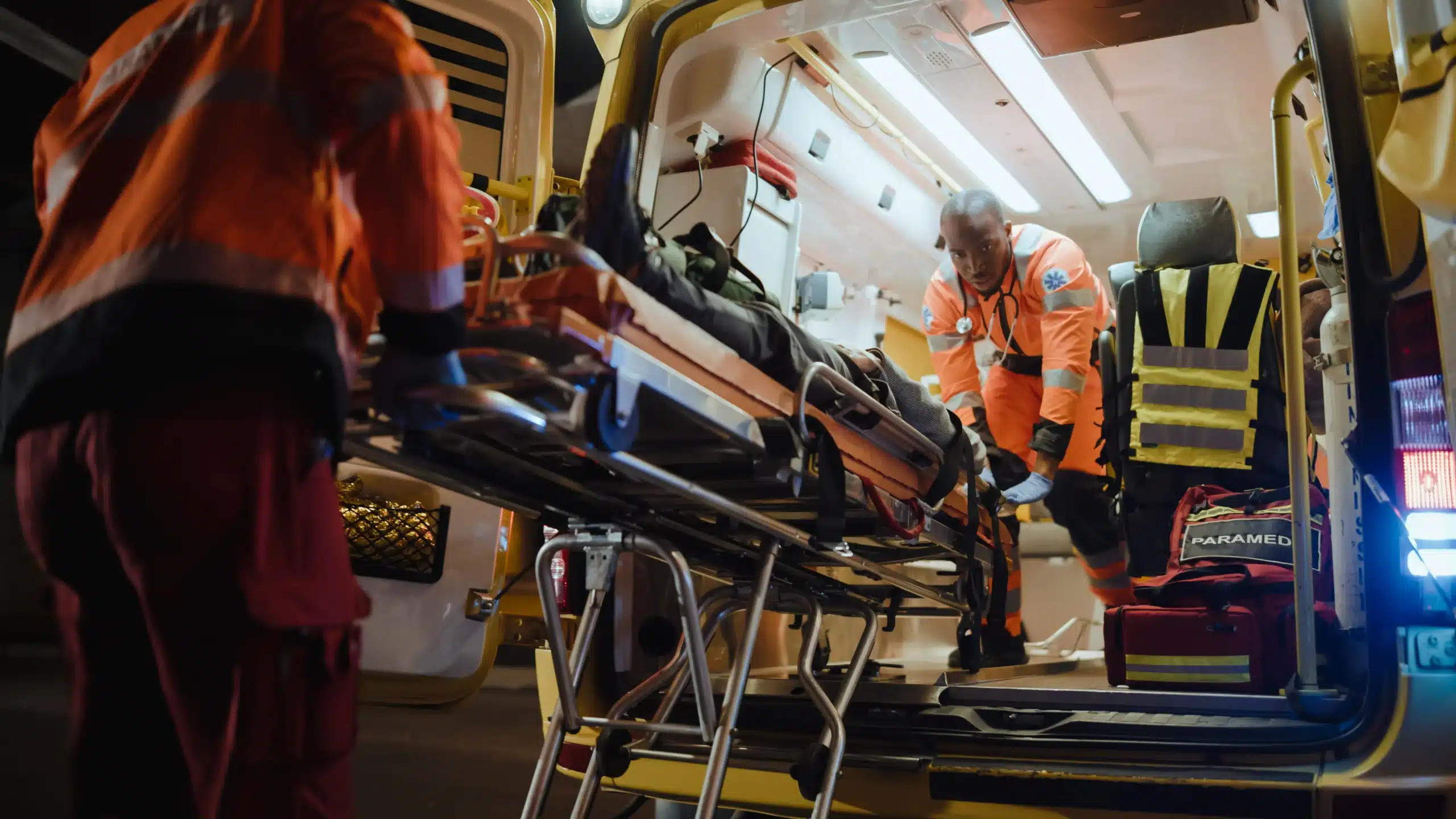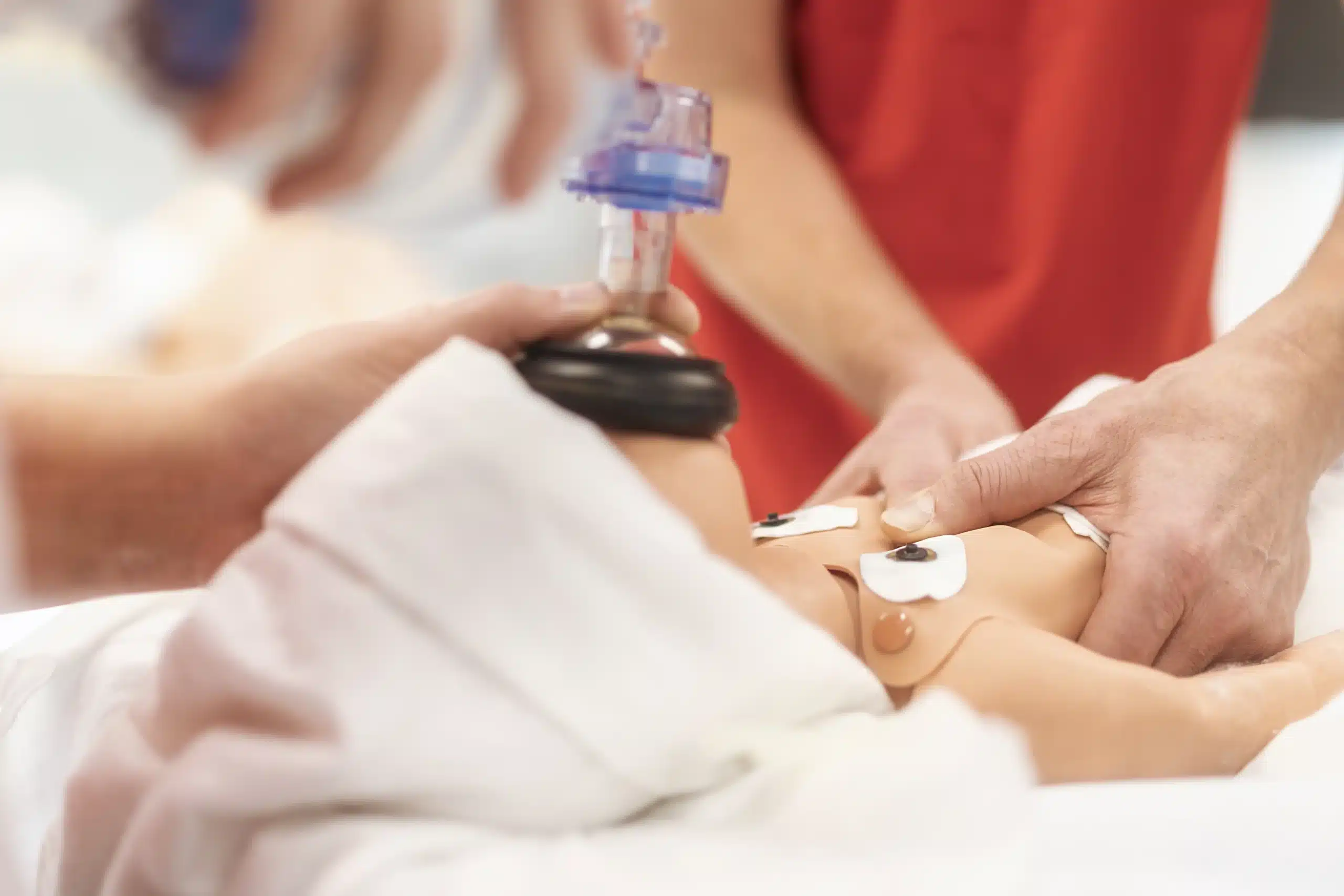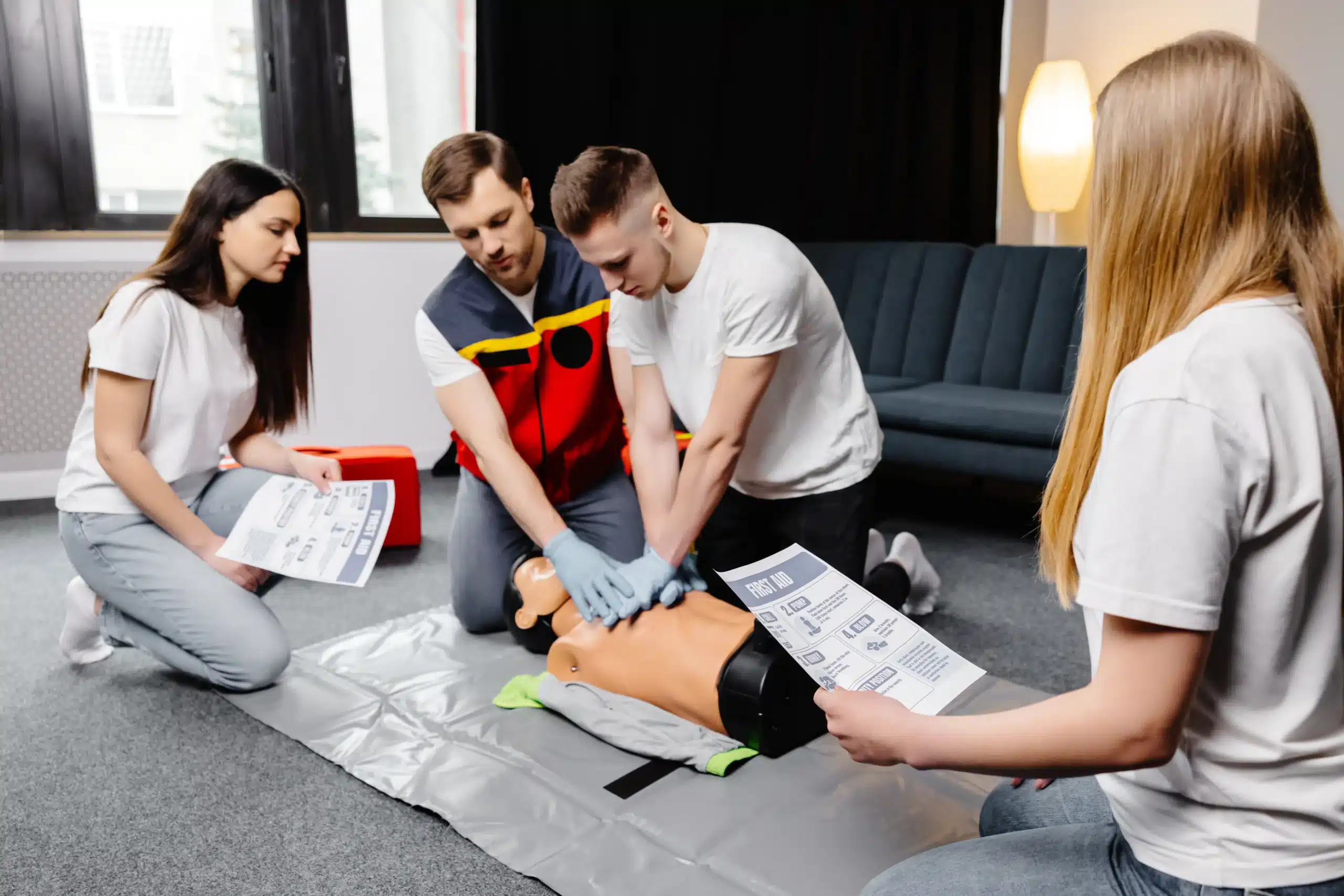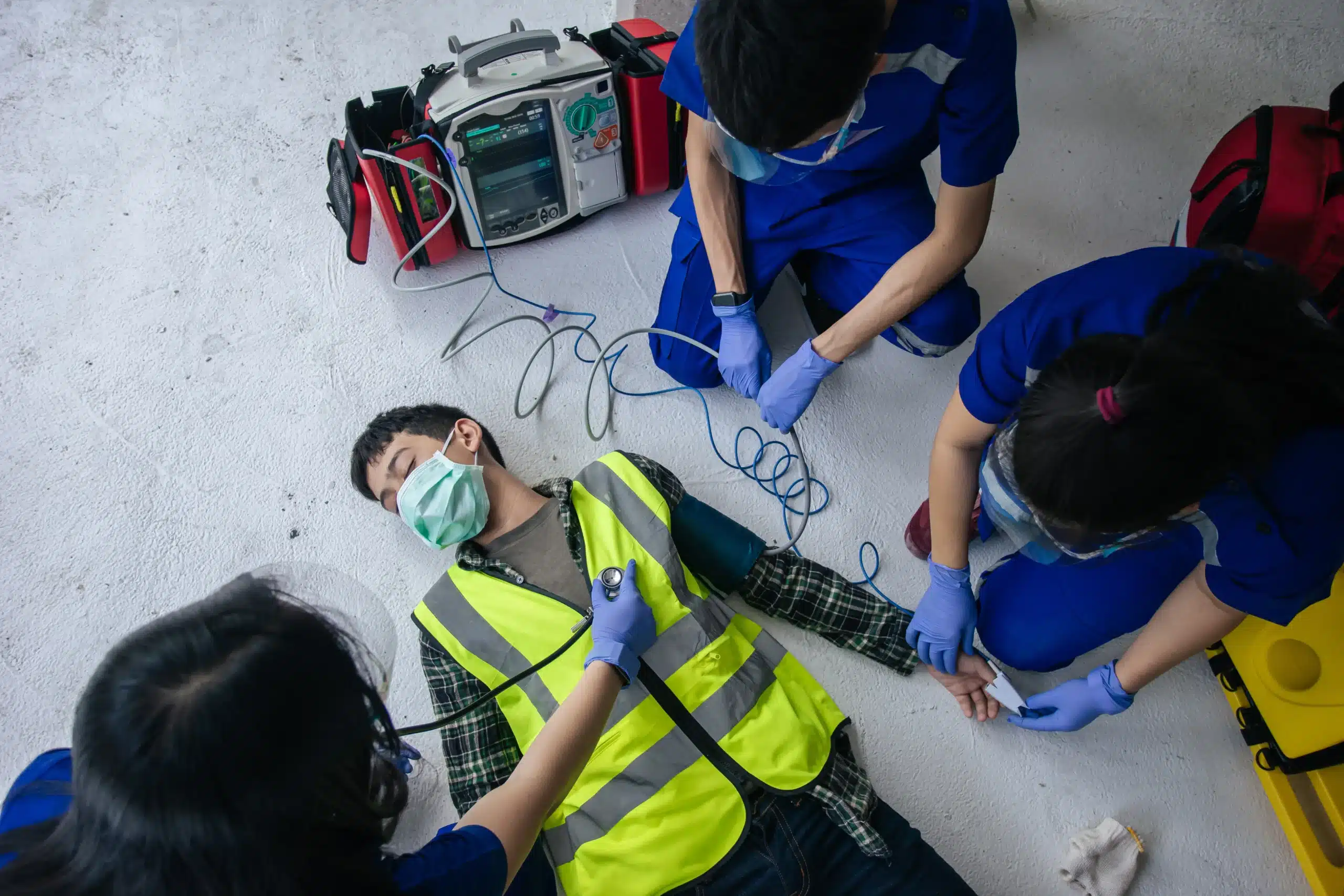Knowing CPR can transform you from a bystander into a potential lifesaver. It’s a skill that empowers you to act confidently in medical emergencies, providing critical support until professional help arrives. This guide demystifies the process of becoming CPR certified. We’ll explore the different types of CPR courses available, from basic CPR and first aid to advanced certifications like BLS and ACLS. We’ll also discuss how to find “CPR courses near me” in Morgan Hill, San Jose, and Gilroy, the costs involved, and the importance of choosing a reputable training provider. Whether you’re pursuing a career in healthcare, fulfilling a job requirement, or simply wanting to be prepared for anything, this guide will help you find the right CPR course to meet your goals.
Key Takeaways
- CPR knowledge empowers you to save lives: From basic CPR to advanced certifications like BLS and ACLS, find the right training to confidently respond in emergencies.
- Choosing the right course involves several factors: Consider your goals, compare course content and formats, and check reviews to find a provider that meets your needs and budget.
- Stay prepared by keeping your certification current: Renew your CPR certification every two years and practice regularly to maintain your skills and confidence.
What is CPR and Why is it Important?
Cardiopulmonary resuscitation (CPR) is a lifesaving technique used when someone’s breathing or heartbeat has stopped. Think of it as emergency support for the heart and lungs. It’s a critical skill because it can dramatically improve the odds of survival during a cardiac arrest. The American Heart Association estimates nearly half a million cardiac arrests happen each year in the US. In these terrifying situations, bystander CPR can double or even triple a victim’s chance of survival. That’s why learning CPR is so important.
Emergencies like cardiac arrest, heart attacks, choking, or drowning can occur without warning. CPR helps bridge the gap, keeping a person alive until professional medical help arrives. It buys precious time and significantly increases their chances of pulling through. The American Red Cross also highlights how crucial bystander CPR is for improving cardiac arrest survival rates. It’s a skill that empowers everyday people to make a real difference, and it’s something everyone should consider learning. If you’re in Morgan Hill, San Jose, or Gilroy and interested in CPR training, explore our course options. We offer various certifications, including BLS, ACLS, and more. We even have group discounts available.
CPR Course Types Near You
Knowing which CPR course fits your needs is the first step. Whether you’re a healthcare professional, a concerned parent, or just someone who wants to be prepared, there’s a course designed for you. Let’s explore some of the common CPR certifications available in Morgan Hill, San Jose, and Gilroy.
Basic CPR Training
Basic CPR training provides the foundational skills needed to respond to cardiac arrest and other emergencies. These courses cover essential techniques like chest compressions, rescue breaths, and how to recognize the signs of a heart attack. This basic CPR training is perfect for anyone who wants to learn life-saving skills, from teachers and coaches to office workers and family members. It’s also a prerequisite for many advanced certifications. At Morgan Hill CPR Classes, we offer American Heart Association certifications in CPR and First Aid, ensuring you receive high-quality training that meets industry standards. For those looking for cost-effective options, we also provide group discounts.
Advanced Life Support (ACLS)
For healthcare providers, Advanced Cardiovascular Life Support (ACLS certification) is crucial. This advanced course builds upon basic CPR skills and delves into more complex algorithms for managing cardiovascular emergencies, including stroke and cardiac arrest. It covers topics like airway management, intravenous drug administration, and electrocardiogram (ECG) interpretation. Morgan Hill CPR Classes offers ACLS training through the American Heart Association, equipping healthcare professionals with the knowledge and skills to provide effective, timely interventions.
Pediatric CPR
When it comes to children, knowing how to respond in a medical emergency can be especially critical. Pediatric Advanced Life Support (PALS certification) focuses on the specific needs of infants and children. This specialized training covers resuscitation techniques, airway management, and treatment protocols tailored to pediatric patients. Healthcare providers who work with children, such as pediatricians, nurses, and paramedics, should consider PALS certification to enhance their emergency response capabilities. At Morgan Hill CPR Classes, we offer PALS training to help you gain confidence in providing care for young patients. Our low price guarantee ensures you’re receiving the best value for your training investment.
Online vs. In-Person CPR
Choosing between online and in-person CPR training often comes down to personal preference and learning style. Online CPR courses offer flexibility, allowing you to learn at your own pace and on your own schedule. However, in-person classes provide hands-on practice and direct interaction with an instructor, which can be beneficial for mastering essential skills. Morgan Hill CPR Classes offers both options—in-person and blended learning—so you can choose the format that best suits your needs. We understand that everyone learns differently, and we strive to provide flexible options to accommodate various learning styles and schedules. Check out our course preparation page for more information.
Find and Choose a CPR Course
Finding the right CPR course requires a little research, but it’s worth the effort. Knowing where to look and what to consider will help you find a course that fits your needs and budget.
Use Online Search Tools
Start your search online. Use search engines like Google to find CPR classes near you. Searching for “CPR classes Morgan Hill” or “CPR certification near me” will generate a list of potential training providers in your area. Look for providers like Morgan Hill CPR Classes that offer flexible scheduling and a variety of certification options. Many training centers have websites that list their course offerings, schedules, and pricing. This allows you to easily compare options and find a course that works for you.
Check Local Facilities
Beyond online searches, check with local facilities that often provide CPR training. Hospitals, community centers, and fire departments frequently offer CPR courses to the public. Contact these organizations directly to inquire about upcoming courses and registration information. For example, Morgan Hill CPR Classes offers a range of American Heart Association certifications, including BLS, ACLS, PALS, CPR, and First Aid, and is committed to providing transparent and competitive pricing. You can also find CPR classes through organizations like the American Red Cross and the American Heart Association. Safety Training Seminars offers AHA-certified BLS, ACLS, PALS, and CPR classes in Morgan Hill.
Assess Your Needs
Before committing to a CPR course, take some time to assess your specific needs. Why are you taking this course? Are you required to have a certain certification for your job or are you learning CPR for personal knowledge? Consider factors like instructor qualifications, course content (BLS, ACLS, PALS), and flexible scheduling options when choosing a CPR training provider. Also, think about the cost. Morgan Hill CPR Classes offers a combined CPR and First-aid course for $140, which covers online training, skills testing, and the certification card. Knowing your needs and budget will help you narrow down your options and choose the best CPR course for you.
CPR Course Costs & Value
Understanding CPR course costs and their value is an important step in choosing the right training. While cost is a factor, the life-saving skills you gain are priceless. Let’s break down the typical expenses and explore ways to find affordable, high-quality CPR training.
Average Course Prices
CPR course costs vary based on several factors, including the type of certification, the course length, and the training provider. A basic CPR course covering adult, child, and infant CPR, along with AED training, typically costs around $35 per person. This usually involves a few hours of instruction and hands-on practice. A combined CPR and First Aid certification often costs around $140 and includes online training, in-person skills testing, and your official certification card. More advanced certifications like Basic Life Support (BLS) for healthcare providers or Advanced Cardiovascular Life Support (ACLS) involve more comprehensive training and consequently have higher price points. Remember to factor in any additional costs, such as study materials or recertification fees, when budgeting for your CPR training.
Group Discounts & Offers
If you’re training a group, such as workplace colleagues or a community organization, explore group discounts. Many CPR training providers offer reduced rates for groups of eight or more. For example, some providers offer group training packages for around $280, making it a cost-effective way to equip your team with essential life-saving skills. Contact local providers or check online platforms like Thumbtack for group discounts and package deals. This can be a smart way to manage costs while ensuring everyone receives proper training.
Low Price Guarantees
Finding quality training at a fair price is essential. Look for CPR training providers, like Morgan Hill CPR Classes, that offer a low-price guarantee. This shows their commitment to providing affordable training without compromising quality. As a woman-owned business, Morgan Hill CPR Classes is dedicated to offering accessible and competitively priced courses in over 60 cities, ensuring that everyone has the opportunity to learn these vital skills. Comparing prices and asking providers about any special offers or discounts is always a good idea.
CPR Training Provider Credentials & Quality
Choosing the right CPR training provider is crucial for a high-quality learning experience. Different organizations offer certifications, each with its own set of standards and recognition. Understanding these differences helps you make an informed decision.
AHA Certification
The American Heart Association (AHA) is a leading authority in CPR training and research. Their certification programs, like BLS, ACLS, and PALS, are highly respected and widely accepted. AHA courses cover comprehensive life-saving techniques and adhere to the latest scientific guidelines. Many healthcare providers and professionals seek AHA certifications due to their rigorous standards and reputation. If you’re pursuing a healthcare career or want comprehensive training, an AHA certification might be the best choice. Morgan Hill CPR Classes offers various AHA-certified courses.
Red Cross Certification
The American Red Cross is another well-known and respected provider of CPR training. Their courses are designed for various audiences, from healthcare professionals to community members. Red Cross certifications are widely recognized and often meet workplace requirements. They offer flexible learning options, including in-person and blended learning formats. Check with your employer or regulatory bodies to ensure a Red Cross certification meets specific job requirements.
Other Certifications
While the AHA and Red Cross are prominent names, other reputable organizations offer valid CPR certifications. It’s essential to do your research and ensure any certification aligns with your needs and is accepted by your employer or relevant organizations. Look for certifications from organizations accredited by the AHA or similar bodies, ensuring the training meets established quality standards. For example, CPR Education provides a range of CPR certification options, including AHA courses. Always verify the legitimacy and recognition of a certification before enrolling. Consider factors like course content, instructor qualifications, and the organization’s reputation when making your decision.
CPR Certification Duration & Renewal
Certification Validity
CPR certifications are typically valid for two years. This standard timeframe gives you ample opportunity to use your skills while ensuring you stay up-to-date with the latest CPR techniques. Keep track of your certification’s expiration date so you can renew it promptly. While online-only CPR courses might offer a certificate of completion, they often don’t satisfy requirements for many workplaces. Always check with your employer or local regulations to confirm acceptance before enrolling in an online CPR course. In-person training is usually required for official certification recognized by organizations like the American Heart Association.
Renewal Process
Renewing your CPR certification is straightforward. Look for “renewal courses” from certified training centers like Morgan Hill CPR Classes. These streamlined courses are designed for recertification, covering essential updates to guidelines and techniques. The renewal process may vary slightly depending on the organization that initially certified you, but most follow a similar structure. Expect a combination of review and practice to refresh your skills and ensure you’re prepared to respond effectively in an emergency. Online certifications generally last between two and three years, so factor that into your schedule. Stay informed about the specific renewal requirements from your certifying organization to avoid any lapses in your certification.
Maintain Your Skills
Even with a valid certification, regular practice is key to maintaining CPR proficiency. The American Red Cross recommends participating in refresher courses or using refresher materials to keep your skills sharp. Consistent practice builds confidence and muscle memory, crucial for effective CPR in stressful situations. Consider incorporating short practice sessions into your routine or attending a refresher course offered by a local provider like Morgan Hill CPR Classes. Staying current with the latest guidelines and techniques ensures you can provide the best possible care during a real-life emergency. Our low price guarantee makes staying current with your training both affordable and accessible.
Local CPR Course Benefits
Choosing a local CPR course offers distinct advantages. Think convenience, community connection, and a boost to both your personal and professional life. Let’s explore some key benefits:
Career Advancement
A CPR certification can significantly enhance your career prospects. Many healthcare professions require CPR certification as a baseline qualification. Even in fields where it’s not mandatory, having this skill listed on your resume demonstrates your commitment to safety and preparedness, making you a more attractive candidate. Many courses, like those offered at Morgan Hill CPR Classes, align with American Heart Association guidelines, ensuring you learn the most up-to-date techniques. This can give you a competitive edge, especially if you’re pursuing roles in healthcare, education, or childcare. Employers value candidates who possess current certifications and demonstrate a proactive approach to professional development.
Life-Saving Skills
Learning CPR equips you with the ability to respond effectively in medical emergencies. CPR certification courses, such as those provided by Morgan Hill CPR Classes, cover essential skills including BLS, ACLS, PALS, CPR, and First Aid. These skills empower you to provide immediate assistance to someone experiencing cardiac arrest, choking, or other life-threatening situations. While you’ll hopefully never need to use these skills, knowing you have them can bring immense peace of mind. It allows you to be prepared and confident in your ability to help loved ones, colleagues, or even strangers in a crisis.
Workplace Safety
CPR-trained employees are invaluable assets in any workplace. CPR certification for businesses and organizations is vital, as it equips employees with the knowledge to respond effectively in emergencies. Having trained individuals on-site can significantly reduce response times in critical situations, potentially minimizing the severity of injuries or even saving lives. Offering AHA courses, BLS CPR, and pediatric CPR ensures that workplaces are prepared for various situations, enhancing overall safety and compliance with health regulations. A safer work environment benefits everyone and can contribute to a more positive and productive workplace culture. For businesses in Morgan Hill, San Jose, and Gilroy, Morgan Hill CPR classes offer convenient and affordable options for group training.
Prepare for Your CPR Course
Getting ready for a CPR course can boost your confidence and make you feel more prepared. Knowing what to expect, what you’ll need, and how to study effectively can make a big difference in your learning experience. This section covers those bases so you can walk into your class ready to learn.
What to Expect
Morgan Hill CPR Classes offers several American Heart Association certifications, including BLS, ACLS, PALS, CPR, and First Aid. You’ll find classes in a variety of formats, including online, in-person, and blended learning (online coursework combined with an in-person skills session). This flexibility lets you choose the learning style that best suits your schedule and preferences. Whether you thrive in a traditional classroom or prefer the convenience of online learning, there’s an option for you.
Materials & Equipment
Typically, the combined CPR and First Aid course costs $140. This covers your online training materials, the in-person skills testing session, and your official certification card. You won’t need to purchase any additional equipment or supplies. If you’re comparing providers, remember to factor in the total cost, including any hidden fees. You can also explore other training providers like Safety Training Seminars for similar courses in the area. Knowing your options helps you make an informed decision.
Tips for Success
Before your class, take some time to review the course preparation materials. Familiarizing yourself with the basic concepts ahead of time will help you absorb the information more effectively during the course. When choosing a CPR training provider in Morgan Hill, consider factors like instructor qualifications, the specific course content (BLS, ACLS, PALS, etc.), and scheduling options. Morgan Hill CPR Classes offers a low-price guarantee, so you can be confident you’re getting a good value. The goal is to find a course that fits your needs and learning style. A little preparation goes a long way!
Top Local CPR Training Providers
Finding the right CPR training provider is a crucial step in your certification journey. Here are some reputable organizations and resources to explore:
American Heart Association
The American Heart Association (AHA) is a leading authority in CPR education and research. They offer a comprehensive range of courses, from Basic Life Support (BLS) for healthcare providers and the general public to Advanced Cardiovascular Life Support (ACLS). AHA courses are known for their rigorous standards and emphasis on high-quality training. For healthcare professionals seeking flexible resuscitation training, the RQI program is a valuable option. Those in Morgan Hill, San Jose, and Gilroy, California, can find AHA-certified training at Morgan Hill CPR Classes.
American Red Cross
The American Red Cross is another well-respected provider of CPR and first aid training. They offer various courses suitable for different needs and experience levels. You can find convenient Red Cross CPR classes in many communities, often with flexible scheduling.
National Safety Council
The National Safety Council (NSC) provides CPR and First Aid training programs for workplaces and individuals. Their focus on practical skills and workplace safety makes them a solid option for professional development or personal enrichment.
American Safety & Health Institute
The American Safety & Health Institute (ASHI) offers various CPR and First Aid courses that meet OSHA and other regulatory standards. They cater to both healthcare professionals and the general public, with options for different certification levels.
ProTrainings
For a flexible learning experience, ProTrainings offers online CPR certification courses. While online learning offers convenience, remember to supplement it with hands-on practice for optimal skill development.
Local Hospitals & Fire Departments
Many local hospitals and fire departments offer CPR training to their communities. Check with your local facilities or search online for “CPR classes near me” to find these resources. These classes are often a cost-effective way to learn essential life-saving skills. Residents of Morgan Hill, San Jose, and Gilroy, California, can benefit from the low-price guarantee and group discounts at Morgan Hill CPR Classes. Their website also offers helpful course preparation resources.
Choose the Right CPR Course
So you’ve decided to get CPR certified—fantastic! Now, how do you choose the right course? It can feel overwhelming with so many options, but by focusing on your goals and doing a little research, you can find the perfect fit.
Define Your Goals
First, think about why you want to learn CPR. Are you fulfilling a job requirement, hoping to become a more well-rounded healthcare professional, or simply gaining the confidence to help in an emergency? Understanding your motivation will guide your decisions. For example, healthcare providers often need specific certifications like Basic Life Support (BLS) or Advanced Cardiovascular Life Support (ACLS), while others might focus on basic CPR and first aid. Consider factors like instructor qualifications, course content, and scheduling options when choosing a CPR training provider in Morgan Hill. Preparing in advance by reviewing course prep materials can also contribute to a more effective learning experience.
Compare Courses
Once you know what you’re looking for, start comparing courses. Look at what different training centers offer. Morgan Hill CPR Classes provides a range of American Heart Association certifications, including BLS, ACLS, and PALS. This ensures comprehensive training options for everyone. Also, think about logistics. Do you need a weekend class or an evening option? Finding a course that works with your schedule is key. Look for training centers that offer flexible scheduling and a variety of certification options. If you’re looking to save money, see if the training center offers group discounts. Many providers understand the financial commitment involved in training and offer a low price guarantee to ensure accessibility.
Read Reviews
Finally, take the time to read reviews. Hearing from others who have taken the course offers valuable insights. What did they think of the instructor? Was the material presented clearly? Did they feel prepared after completing the training? Reviews often highlight the strengths and weaknesses of a program. Providers like Morgan Hill CPR Classes offer various certifications, flexible schedules, and competitive pricing, making high-quality CPR training accessible. A comprehensive curriculum is essential for building confidence in your CPR skills. By considering your goals, comparing options, and reading reviews, you can find the perfect course to meet your needs and prepare you for a potential emergency.
Related Articles
- Why CPR is Critical in Modern Healthcare
- CPR Certification in San Jose: Your Complete Guide
- CPR Certification Near Me: A Practical Guide – Morgan Hill CPR Classes
- CPR Renewal in Morgan Hill: Your Guide – Morgan Hill CPR Classes
- Online CPR Classes in Morgan Hill: Your Complete Guide
Frequently Asked Questions
What’s the difference between BLS and ACLS certification?
BLS (Basic Life Support) certification covers fundamental CPR skills and is suitable for anyone, including healthcare providers and the general public. ACLS (Advanced Cardiovascular Life Support) certification builds upon BLS and is designed for healthcare professionals, covering more complex algorithms for managing cardiovascular emergencies and other critical situations. ACLS delves into advanced airway management, pharmacology, and team dynamics.
How long does a CPR certification last, and how do I renew it?
CPR certifications are typically valid for two years. To renew, look for “renewal courses” offered by certified training centers. These courses cover updates to guidelines and refresh essential skills. The renewal process usually involves a review of key concepts and a practical skills assessment.
What if I’m nervous about the in-person skills test?
It’s completely normal to feel a little nervous about the skills test. Most instructors create a supportive learning environment. Review the course materials beforehand and ask your instructor any questions you have. The more familiar you are with the material, the more confident you’ll feel. Remember, the goal is to learn life-saving skills, and instructors are there to help you succeed.
Are online CPR courses accepted everywhere?
While online CPR courses offer convenience, they might not meet the requirements for all workplaces or organizations. Some professions require in-person training and certification. Always check with your employer or the relevant regulatory bodies to ensure an online course fulfills their specific requirements. Often, a blended learning approach—combining online coursework with an in-person skills session—is the best option.
How can I find affordable CPR training near me?
Start by searching online for “CPR classes near me.” Many training providers list their course offerings, schedules, and pricing on their websites. Look for providers that offer group discounts or low-price guarantees. Also, check with local hospitals, community centers, and fire departments, as they often offer CPR courses to the public. Comparing prices and asking about discounts can help you find quality training that fits your budget.
